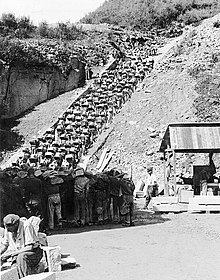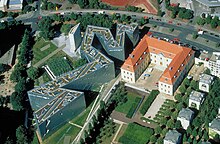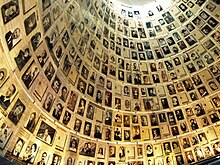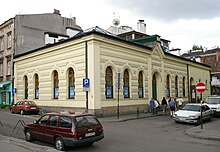Gedenkdienst
This article has multiple issues. Please help improve it or discuss these issues on the talk page. (Learn how and when to remove these template messages)
|
| Gedenkdienst | |
| Purpose | Holocaust remembrance |
|---|---|
| Foundation | 1992 |
| Website | https://gedenkdienst.at/ |
Gedenkdienst is a concept in Austria aimed at young people to face and take responsibility for the darkest chapters of the country's history while being financially supported by Austrian government.
Founded in Austria in 1992 by Andreas Maislinger, the Gedenkdienst is an alternative to Austria's compulsory national military service as well as a volunteering platform for Austrians to work in Holocaust and Jewish culture-related institutions around the world with governmental financial support.
The Austrian Gedenkdienst seeks to serve the remembrance of the crimes of Nazism, commemorates its victims and supports Jewish cultural future. The program is rooted in the acknowledgment of responsibility by the Austrian government for the crimes committed by the Nazis.[1]
History[edit]

Origin[edit]
The historian, political scientist and scientific director of the Braunau Contemporary History Days Andreas Maislinger promoted the idea of an alternative to the compulsory military service dedicated to the research, understanding and remembrance of the Holocaust as well as the commemoration of its victims since the late 1970s.[2][3]
In 1991 Austrian chancellor Franz Vranitzky was the first chancellor of Austria to admit to and acknowledge the Austrian people's share of responsibility for the crimes committed by National Socialism during WWII.[4] The new approach rejected the then established myth of Austria merely being the first victim of Nazism. This signaled a new approach within the Austrian political establishment regarding its stance and treatment of Austria's and Austrians' roles during the time of National Socialism.
Following these events, the Austrian government vouched to finance a Gedenkdienst with the first Austrian Holocaust Memorial Servant starting in 1992.[2]
After amendments to Austrian law in 2014, women or men who are not required to perform civilian service have also been able to perform memorial service and receive the same state funding since 2014.[5] Moreover, a new amendment, which came into force in September 2023, increased the financial resources for those performing memorial service and opened up the possibility of continuing memorial service in Austria in the event of disasters such as the coronavirus pandemic. In addition, there is now a centralised record of completed memorial service.[6]
Acknowledgmen[edit]
I follow the works of the Gedenkdienst with great interest and the organization has my full support.
I often claimed there is no Austrian association which sends young people to Israel, like the German organization “Aktion Sühnezeichen”. It touched me to read there is now, thanks to the possibility to perform the Austrian civilian service within the framework of the Gedenkdienst.
As a former Polish political prisoner of a fascist Concentration Camp and historian of World War II, I want to take the honoring opportunity to speak in front of the high house. I want to thank all the young Austrians, which work so hard for the remembrance of the past. Here I specially think of the people of the documentation archive of the Austrian resistance under the leadership of Prof. Wolfgang Neugebauer, the Austrian Camp Community Mauthausen, the Gedenkdienst, and also the local initiatives of the communities Gusen, Langenstein und St. Georgen in Oberösterreich, the working circle for homeland, memorial and history care.
I thank you for the information about the positive result from your accomplished Gedenkdienst.
The Gedenkdienst is a very impressive initiative.
I feel very close to this organization and I have great respect for the servants, because what they achieve is the right way for Austria – to look the past directly into the eyes and to do something against it. Not to say, we were the first victims.
I like to support and recommend the Gedenkdienst initiative. It is a real service which can be and should be provided by young people.
Many people have no idea what those young Austrians achieve for themselves, that they straighten up their backbones, so they can walk straight again, also myself, who belongs to this generation.
I consider the project Gedenkdienst as an important and valuable initiative in the service of peace and the peoples' communication.
Gedenkdienst is remembrance work, which is also a bridge between “Yesterday's World” and the modern and democratic Austria. It also is a reminder that today's values like a sense of responsibility and moral courage did not lose their importance.
Each Generation has to be aware of the horror of the past, to be able to build a new world of peace and respect for human rights. The project Gedenkdienst serves this important challenge of sensitizing for the meaning of the words “Never forget.
Supporting associations[edit]
Association Never Forget from 1994 to 2017[edit]
The association provided positions in 19 memorial sites in Germany and Poland. The association "Never Forget" took an active part in youth work against forgetting. The association stopped operations and became defunct in 2017.[7]
Austrian Service Abroad since 1998 (Österreichischer Auslandsdienst)[edit]
Andreas Hörtnagl and Andreas Maislinger founded the organization "Austrian Service Abroad" in 1998.
The organization is the largest in Austria and sends Auslandsdiener to six continents of the world to accomplish Holocaust commemoration work, social services and peace services. The Austrian Service Abroad is characterized by offering three types of service: the Gedenkdienst, the Austrian Social Service and the Austrian Peace Service. In May 2023, Maislinger stepped down as chairman after public criticism for alleged abuse of power.[8]
The Gedenkdienst since 1992[edit]
The Gedenkdienst association was founded in 1992 by Walter Guggenberger (SPÖ), Andreas Hörtnagl (ÖVP) and Andreas Maislinger (non-party) to raise awareness about the Holocaust, its causes and consequences.[9] In 2008, female volunteers were supported for the first time by the newly created Geschwister Mezei Fund. This was set up with the aim of offering women the opportunity to perform memorial service under the same conditions as those doing alternative civilian service.[10] This was made possible for all sponsoring organisations with the amendment to the Volunteer Act in 2014.[5] This organisation received the Leon Zelman Prize in 2013.[11]
In addition to its volunteer activities, the Gedenkdienst also offers events and projects in the field of historical and political education.[12][13]
Partner organizations[edit]











This article needs to be updated. (May 2023) |
See also[edit]
- Andreas Maislinger
- Stefan Stoev
- Austrian Peace Service
- Austrian Service Abroad
- Austrian Social Service
- House of Responsibility
- Paper Clips Project
References[edit]
- ^ "Verein – GEDENKDIENST" (in German). Retrieved 4 July 2024.
- ^ a b c d e f g h i j k l m n o p q r s t u v w x y z aa ab ac ad ae af ag ah ai aj ak al am an "How Austria's Youth Are Building Bridges to the Global Jewish Community". Times of Israel. Cite error: The named reference ":0" was defined multiple times with different content (see the help page).
- ^ "Gedenkdienst: Maislinger Ehrenritter". salzburg.orf.at (in German). 3 October 2012. Retrieved 4 July 2024.
- ^ "Austrian Acknowledgement of Guilt for Holocaust Welcomed by Survivors". Jewish Telegraphic Agency. 10 July 1991.
- ^ a b "Gedenkdienst leisten – GEDENKDIENST" (in German). Retrieved 4 July 2024.
- ^ "Neues Freiwilligengesetz". freiwillig-engagiert (in German). Retrieved 4 July 2024.
- ^ "Unsichere Zukunft für Gedenkdienste". DER STANDARD (in Austrian German). Retrieved 4 July 2024.
- ^ Ennemoser, Magdalena (12 May 2023). "Vorsitzender Andreas Maislinger verlässt Auslandsdienst". Tiroler Tageszeitung Online (in German). Retrieved 18 May 2023.
- ^ "Wir über uns – Selbstverständnis – GEDENKDIENST" (in German). Retrieved 4 July 2024.
- ^ "Gedenkdienst - nun auch für Frauen: erste Auswahl 21.-23. 12. 2007". ERINNERN: NATIONALSOZIALISMUS UND HOLOCAUST (in German). Retrieved 4 July 2024.
- ^ Presse-Service (13 June 2013). "Archivmeldung: Erster Leon Zelman-Preis geht an "Verein GEDENKDIENST"". Presseservice der Stadt Wien (in German). Retrieved 4 July 2024.
- ^ "Projekte – GEDENKDIENST" (in German). Retrieved 4 July 2024.
- ^ "Veranstaltungen – GEDENKDIENST" (in German). Retrieved 4 July 2024.
- ^ "Buenos Aires, Argentinien – GEDENKDIENST" (in German). Retrieved 9 May 2019.
- ^ a b c d e f g h i j k l m n o p q r s t u v w x y z aa ab ac ad ae af ag ah ai aj ak al "Dienststellen". Österreichischer Auslandsdienst (in German). Retrieved 9 May 2019.
- ^ "Berlin – AFZ, Deutschland – GEDENKDIENST" (in German). Retrieved 9 May 2019.
- ^ "Berlin – GDW, Deutschland – GEDENKDIENST" (in German). Retrieved 9 May 2019.
- ^ "Oranienburg, Deutschland – GEDENKDIENST" (in German). Retrieved 9 May 2019.
- ^ "Chania, Griechenland – GEDENKDIENST" (in German). Retrieved 9 May 2019.
- ^ "Akko, Israel – GEDENKDIENST" (in German). Retrieved 9 May 2019.
- ^ "Jerusalem – LBI, Israel – GEDENKDIENST" (in German). Retrieved 9 May 2019.
- ^ "Jerusalem – YV, Israel – GEDENKDIENST" (in German). Retrieved 9 May 2019.
- ^ "Tel Aviv, Israel – GEDENKDIENST" (in German). Retrieved 9 May 2019.
- ^ "Monte Sole, Italien – GEDENKDIENST" (in German). Retrieved 9 May 2019.
- ^ a b "Gedenkdienst - Nationalfonds der Republik Österreich für Opfer des Nationalsozialismus" (in German). Retrieved 4 July 2024.
- ^ "Vilnius, Litauen – GEDENKDIENST" (in German). Retrieved 25 May 2024.
- ^ "Amsterdam, Niederlande – GEDENKDIENST" (in German). Retrieved 9 May 2019.
- ^ "Lublin, Polen – GEDENKDIENST" (in German). Retrieved 9 May 2019.
- ^ "Oświęcim, Polen – GEDENKDIENST" (in German). Retrieved 9 May 2019.
- ^ "New York, USA – GEDENKDIENST" (in German). Retrieved 25 May 2024.
- ^ "Washington, D.C., USA – GEDENKDIENST" (in German). Retrieved 25 May 2024.
- ^ "London, Großbritannien – GEDENKDIENST" (in German). Retrieved 9 May 2019.
External links[edit]
- Austrian Service Abroad
- "Harald Edinger". Voices on Antisemitism. United States Holocaust Memorial Museum. 1 January 2009.
- Anti-fascism
- Holocaust commemoration
- Holocaust-related organizations
- Simon Wiesenthal Center
- Aftermath of World War II in Austria
- Foreign relations of Austria
- Innsbruck
- Braunau am Inn
- International nongovernmental organizations
- Non-profit organisations based in Austria
- Jews and Judaism in Austria
- Student exchange
- Organizations established in 1992
- The Holocaust in Austria
- 1992 establishments in Austria
